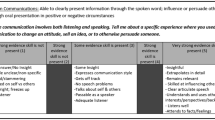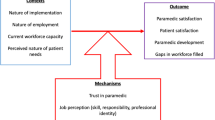Abstract
Background
The Primary Care Exception (PCE) is a billing rule from the Centers for Medicare and Medicaid Services (CMS) that allows supervising physicians to bill for ambulatory care provided by a resident without their direct supervision. There has been increased focus on entrustment as a method to assess readiness for unsupervised practice.
Objective
To understand the factors influencing attending physicians’ use of the PCE in ambulatory settings and identify common themes defining what motivates faculty preceptors to use the PCE.
Approach
This was a qualitative exploratory study. Participants were interviewed one-on-one using a semi-structured template informed by the entrustment literature. Analysis was conducted using a thematically framed, grounded theory-based approach to identify major themes and subthemes.
Participants
Twenty-seven internal medicine teaching faculty took part in a multi-institutional study representing four residency training programs across two academic medical centers in Connecticut.
Key Results
Four predominant categories of themes influencing PCE use were identified: (1) clinical environment factors, (2) attending attitudes, (3) resident characteristics, and (4) patient attributes. An attending’s “internal rules” drawn from prior experiences served as a significant driver of PCE non-use regardless of the trainee, patient, or clinical context. A common conflict existed between using the PCE to promote resident autonomy versus waiving the PCE to promote safety.
Conclusions
The PCE can serve as a tool to support resident autonomy, confidence, and overall clinical efficiency. Choice of PCE use by attendings involved complex internal decision-making schema balancing internal, patient, resident, and environmental-related factors. The lack of standardized processes in competency evaluation may increase susceptibility to biases, which could be mitigated by applying standardized modes of assessment that encompass shared principles.

Similar content being viewed by others
References
O’Dowd E, Lydon S, O’Connor P, Madden C, Byrne D. A systematic review of 7 years of research on entrustable professional activities in graduate medical education, 2011-2018. Med Educ. 2019;53(3):234-249. doi:https://doi.org/10.1111/medu.13792
Ten Cate O, Hart D, Ankel F, et al. Entrustment Decision Making in Clinical Training. Acad Med. 2016;91(2):191-8. doi:https://doi.org/10.1097/ACM.0000000000001044
Cantillon P, Macdermott M. Does responsibility drive learning? Lessons from intern rotations in general practice. Med Teach. 2008;30(3):254-9. doi:https://doi.org/10.1080/01421590701798703
Hauer KE, Oza SK, Kogan JR, et al. How clinical supervisors develop trust in their trainees: a qualitative study. Med Educ. 2015;49(8):783-95. doi:https://doi.org/10.1111/medu.12745
Sheu L, Kogan JR, Hauer KE. How Supervisor Experience Influences Trust, Supervision, and Trainee Learning: A Qualitative Study. Acad Med. 2017;92(9):1320-1327. doi:https://doi.org/10.1097/ACM.0000000000001560
Sterkenburg A, Barach P, Kalkman C, Gielen M, ten Cate O. When do supervising physicians decide to entrust residents with unsupervised tasks? Acad Med. 2010;85(9):1408-17. doi:https://doi.org/10.1097/ACM.0b013e3181eab0ec
Hatala R, Ginsburg S, Hauer KE, Gingerich A. Entrustment Ratings in Internal Medicine Training: Capturing Meaningful Supervision Decisions or Just Another Rating? J Gen Intern Med. 2019;34(5):740-743. doi:https://doi.org/10.1007/s11606-019-04878-y
Melvin L, Rassos J, Stroud L, Ginsburg S. Tensions in Assessment: The Realities of Entrustment in Internal Medicine. Acad Med. 2020;95(4):609-615. doi:https://doi.org/10.1097/ACM.0000000000002991
Centers for Medicare & Medicaid Services (CMS). Guidelines for Teaching Physicians, Interns, and Residents. Medicare Learning Network. 2021. https://www.cms.gov/outreach-and-education/medicare-learning-network-mln/mlnproducts/downloads/teaching-physicians-fact-sheet-icn006437.pdf. Accessed October 2022.
Cawse-Lucas J, Evans DV, Ruiz DR, et al. Impact of the Primary Care Exception on Family Medicine Resident Coding. Fam Med. 2016;48(3):175-9.
Tobin DG, Doolittle BR, Ellman MS, Ruser CB, Brienza RS, Genao I. Modifying the Primary Care Exception Rule to Require Competency-Based Assessment. Acad Med. 2017;92(3):331-334. doi:https://doi.org/10.1097/ACM.0000000000001293
Gielissen KA, Ahle SL, Wijesekera TP, Windish DM, Keene DE. Making Sense of Trainee Performance: Entrustment Decision-Making in Internal Medicine Program Directors. Yale J Biol Med. 2020;93(3):403-410.
Hauer KE, Ten Cate O, Boscardin C, Irby DM, Iobst W, O’Sullivan PS. Understanding trust as an essential element of trainee supervision and learning in the workplace. Adv Health Sci Educ Theory Pract. Aug 2014;19(3):435-56. doi:https://doi.org/10.1007/s10459-013-9474-4
Goldszmidt M, Faden L, Dornan T, van Merriënboer J, Bordage G, Lingard L. Attending physician variability: a model of four supervisory styles. Acad Med. 2015;90(11):1541-6. doi: https://doi.org/10.1097/ACM.0000000000000735
Gingerich A, Daniels V, Farrell L, Olsen SR, Kennedy T, Hatala R. Beyond hands-on and hands-off: supervisory approaches and entrustment on the inpatient ward. Med Educ. 2018;52(10):1028-1040. doi: https://doi.org/10.1111/medu.13621
Baer MD, Matta FK, Kim JK, Welsh DT, Garud N. It’s not you, it’s them: Social influences on trust propensity and trust dynamics. Personnel Psychol. 2018;71(3):423-55.
Penner JC, Hauer KE, Julian KA, Sheu L. How preceptors develop trust in continuity clinic residents and how trust influences supervision: A qualitative study. Perspect Med Educ. 2022;11(2):73-79. doi:https://doi.org/10.1007/s40037-021-00694-5
Ahle SL, Gielissen K, Keene DE, Blasberg JD. Understanding Entrustment Decision-Making by Surgical Program Directors. J Surg Res. 2020;249:74-81. doi:https://doi.org/10.1016/j.jss.2019.12.001
Medicare program; Revisions to payment policies and adjustments to the relative value units under the physician fee schedule for calendar year 1996—HCFA. Final rule with comment period. Fed Regist. 1995;60:6312463357.
ten Cate O. Trust, competence, and the supervisor’s role in postgraduate training. BMJ. 2006;333(7571):748-51. doi:https://doi.org/10.1136/bmj.38938.407569.94
Kelleher M, Kinnear B, Sall D, et al. A Reliability Analysis of Entrustment-Derived Workplace-Based Assessments. Acad Med. 2020;95(4):616-622. doi:https://doi.org/10.1097/ACM.0000000000002997
Ryan MS, Richards A, Perera R, et al. Generalizability of the Ottawa Surgical Competency Operating Room Evaluation (O-SCORE) Scale to Assess Medical Student Performance on Core EPAs in the Workplace: Findings From One Institution. Acad Med. 2021;doi:https://doi.org/10.1097/ACM.0000000000003921
Author information
Authors and Affiliations
Corresponding author
Ethics declarations
Conflict of Interest
The authors declare they have no conflict of interest to disclose.
Additional information
Publisher's Note
Springer Nature remains neutral with regard to jurisdictional claims in published maps and institutional affiliations.
Supplementary Information
Below is the link to the electronic supplementary material.
Rights and permissions
Springer Nature or its licensor (e.g. a society or other partner) holds exclusive rights to this article under a publishing agreement with the author(s) or other rightsholder(s); author self-archiving of the accepted manuscript version of this article is solely governed by the terms of such publishing agreement and applicable law.
About this article
Cite this article
Patel, R., Marquis, T.J., Cook, A. et al. A Qualitative Study of Drivers for Use of the Primary Care Exception Among Internal Medicine Teaching Faculty. J GEN INTERN MED 39, 255–262 (2024). https://doi.org/10.1007/s11606-023-08406-x
Received:
Accepted:
Published:
Issue Date:
DOI: https://doi.org/10.1007/s11606-023-08406-x




